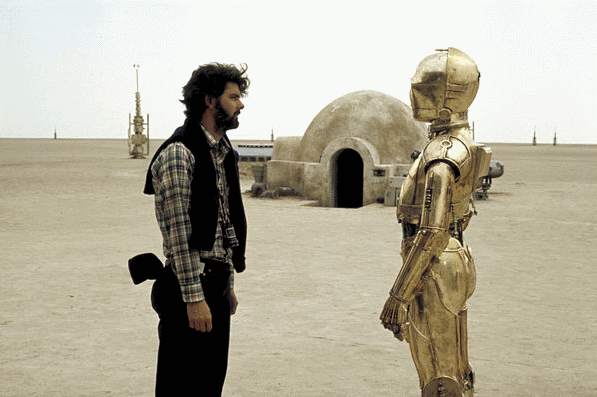George Lucas is probably one of the most loved and reviled filmmaker in the genres.
Lucas went his own way on a lot of decisions, and while much of what he’s done over his career was pure genius, he’s lately been branded insane by many of his so-called ‘fans’, especially on Internet discussion forums.

In an interview with The New York Times about his upcoming film Red Tails, an adventure film which depicts the Tuskegee Airmen, Lucas gives his side of this conflict, and comes off as a sympathetic victim, and a very weary person.
He tells his moviemaking history in brief, first discussing how much it hurt him when he first began making films, as studio executives would barge in and make all kinds of changes to his films. Now, these were changes Lucas didn’t want made to films with his name on them.
Clearly, George sees his films as very personal works, and being told that he has to change them becomes emotionally painful for him. This is why, after American Graffiti, he chose never to make another film unless he had full creative control. He started his own studio, and started making the films he wanted to make, and for a time it went well. Lucas felt free to explore his creative space at will, and enjoyed lots of admiration and devotion from fans in exchange.
As his own tastes changed over the years however, his art began to take on a different shape, and the studio executives he once hated for telling him what to do with his films were replaced by shouting ‘fans’.
He sees the beginning of it being the ‘Han shot first’ debacle, when Lucas looked back at the first Star Wars film, and decided that one of his characters’ action didn’t fit with his own view of the character, so with no one to say he couldn’t, he changed it.
The voices that cried out from the theaters sounded to Lucas an awful lot like the voices of the executive, years earlier, telling him what he could and could not do with his own films.
That was just the beginning, after a few more changes to his original Star Wars films, three jokingly panned new films, and a mostly-hated Indiana Jones sequel, Lucas is starting to wonder what the point is.
“I think there are a lot more important things in the world,” he says. “Why would I make any more [Star Wars] when everybody yells at [me] all the time and says what a terrible person [I am]?”
His frustration continued as he said “On the Internet, all those same guys that are complaining I made a change are completely changing the movie,” Lucas says, referring to fans who re-cut his films on their own. “I’m saying: ‘Fine. But my movie, with my name on it, that says I did it, needs to be the way I want it.’”
As an artist myself, I understand his sentiment, and I’m usually the one geek in the conversation defending Lucas’s right to do as he will with his own intellectual property, but one must ask: At what point does a classic like Star Wars stop being the property of the creator? We know what the legal answer is, but does Lucas, through his creation of such a well-regarded film series, have some semblance of responsibility to the fans, or do entitled fans become just one more stumbling block to the desire for true expression?
There is no word as to how serious this comment is, and I’d expect some clarification later of what sounds, right now, as something uttered in haste and frustration. Hopefully, this sense of futility which has overcome the legendary director will not cause his current Star Wars projects to be cancelled. I’m quite enjoying The Clone Wars, and Star Wars: Underworld will be a sight to behold if it ever gets picked up.






